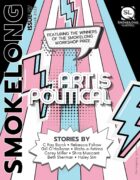The fire imagery that bookends your piece is really striking, very effective in encapsulating the emotions of the piece. What was your inspiration behind it?
Girl rage alchemizing into pyrotechnics is an allegory for emotional excess, affective bigness.
My chief inspiration here is revolutionary feminism. I don’t know whether or not it works, but I want the reader, even just one reader, to feel the explosive madness in the heart of this girl protagonist. I’m the writer but I’m really just representing her. She’s the one who wants to be heard and (if I may) needs to be heard. I want her to be capable of setting the whole world on fire. I want her to want to set the world on fire. And I want her to set the world on fire.
The fire imagery came to me when I was trying to drill down into the subjectivity of the protagonist. It came in at the end first, then I went back and wrote the beginning to set up the fire but also to set up a type of collaborative, slightly wild vibe between the father and daughter.
The relationship between humans and fire is so fascinating and intense. We make fire and we use fire but we also lose control of fire all the time. We make girls and we use girls. I hope we lose control of girls, too. That’s what I’m riffing on.
How intentional were the parallels between the main character in the pool and the cat in the rainstorm? What does the cat represent for you?
The cat is a landing place for the protagonist’s wish for a different set of circumstances. She wants to be in charge of taking care of something in order to experience the mastery of doing it right. I’m able to let the cat be more clearly distressed and in need of rescue than I could ever let the girl be. But the cat also gives the girl an opportunity to experience her own agency and this is meant to be important and powerful.
Does the setting of Best Western specifically have any significance?
The Best Western setting gets at that feeling of ordinary no-man’s-land-ness—gas stations, rest stops, parking lots, Walmart, small airports—places we pass through that contain an eerie liminality where accountability can be easily skirted. The Best Westerns are transitory spaces where all the evidence has just been wiped away, where there’s a pretense of normality but an undercurrent of semi-abandonment and disrepair.
I have a sustained reverence for anthropologist Kathleen Stewart’s Ordinary Affects, which is a real study in refusing grand narrative in favor of the half-glimpsed, fleeting moments we might dismiss as unimportant but that actually form the backbone of our ontology, everyday life, and memories. Stewart’s work teaches me to mine the spaces between, the lingering resonances, and the subtle shifts, as sites for excavating and revealing the threads that suture us to the here and now.
When writing your piece, did you imagine a certain identity for the main character, or do you see it as open for interpretation?
Both. I like characters who are specific and general. My main character is a pretty ordinary U.S. American white girl. She’s not quite sure who she is, she’s too young and unfree for much of an identity, but she’s deeply curious about the world. More than anything, she wants to know how she’s supposed to be. She’s in that space where abused children grow up, with a dual consciousness of the simultaneous normalness and emergency of her life. She’s a kind of fugitive in the tradition of Fred Moten, a cultural theorist and poet who writes about how marginalized identities create alternative ways of being and knowing that resist singular categorization. Moten argues for a mode of interpretation that acknowledges the incompleteness of any single perspective, especially where power is concerned. His work demonstrates how interpretation itself can be a creative act rather than a fixed conclusion. I am engaging in that creativity, but I’m also giving it over to the reader and their own interpretive creative process, what Moten has described as “consent not to be a single being.”
Despite the story spanning multiple different occasions, you chose to write in present tense for each experience. Does this reflect the main character’s sense of helplessness at the end of the story?
There might be a relationship between tense and helplessness but it’s not a tight one. I like the present tense for its urgency and in this kind of story, I like the way it allows the reader to experience the memories of the protagonist, the way she might feel them herself, the ways memories articulate themselves in our minds when we are going over the things that have happened to us. I’m persuaded by the psychoanalytic finding that traumatic experiences settle into the body as a kind of present tense, always haunting.



 The core workshop of SmokeLong Fitness is all in writing, so you can take part from anywhere at anytime. We are excited about creating a supportive, consistent and structured environment for flash writers to work on their craft in a community. We are thrilled and proud to say that our workshop participants have won, placed, or been listed in every major flash competition. Community works.
The core workshop of SmokeLong Fitness is all in writing, so you can take part from anywhere at anytime. We are excited about creating a supportive, consistent and structured environment for flash writers to work on their craft in a community. We are thrilled and proud to say that our workshop participants have won, placed, or been listed in every major flash competition. Community works.